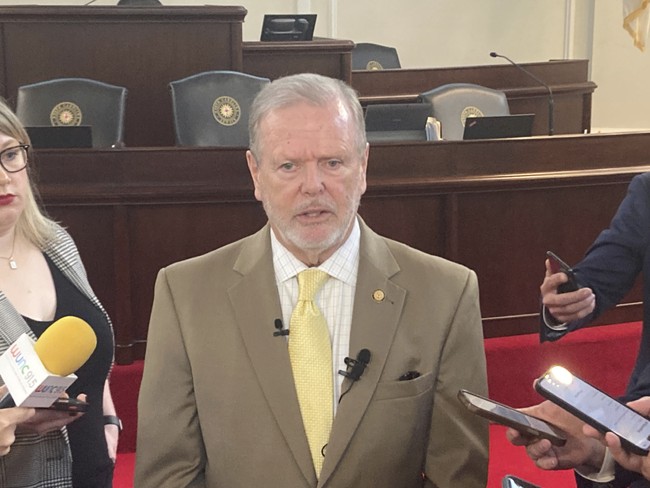We support our Publishers and Content Creators. You can view this story on their website by CLICKING HERE.

As we’ve reported, the one statewide race in North Carolina that has not been decided is the Supreme Court race between Justice Allison Riggs (D) and Court of Appeals Judge Jefferson Griffin (R).
Advertisement
When we last left you, Griffin had formally requested a recount (on 11/19), which made sense considering Riggs was only ahead by 623 votes at the time. After he made the request she was suddenly up by 722 because some county boards of election were late completing their official results.
And that particular little factoid has raised a lot of questions about how the post-election day process has played out. For example, Griffin was ahead of Riggs by around 10,000 votes the morning after the election (11/6). But during what was supposed to be a 10-day canvass process, his lead gradually eroded as overseas/military absentee ballots were counted and provisionals were reviewed for possible acceptance or denial.
As we also reported, the state’s most populous county – Wake County, which is Dem-heavy – didn’t post their final updates including accepted provisionals until Friday night (11/15), with numbers that happened to be just enough to put Riggs over Griffin for the first time by 150 or so votes. To some, it seemed as though Wake had been waiting to find out how many votes were needed to give Riggs the lead.
READ MORE: What’s Going On? Terrible Optics From NC Board of Elections As Supreme Court Race Still Not Decided
To make matters worse, that same night, the State Board of Elections announced that some counties had not been able to complete their canvassing on the 15th, the original deadline, and would be resuming on Monday. When all was said and done, vote totals were still being updated on 11/20, a full two weeks after the election and five days after the 11/15 deadline.
Advertisement
Though Republican state leaders in the General Assembly had stayed quiet for most of this process, state Senate Leader Phil Berger couldn’t stay silent about it anymore, telling reporters Wednesday that in his view this was another example of a “count until somebody you want to win, wins,” strategy:
After Senate leader Phil Berger told reporters that this year’s post-election vote counting process is “another episode of ‘count until somebody you want to win, wins,’” the leader of the State Board of Elections has called on him to retract the statement.
Berger made the comment while answering questions about a provision in legislation passed this week that would require election officials to finish tallying provisional and mail-in ballots more quickly.
[…]
Berger said he’s suspicious that some counties have been slow to process ballots and provide a final vote count. “We see that we are now, what, almost three weeks from the election, and they’re still counting votes — something ain’t working right.”
Predictably, the pearl-clutching from the Usual Suspects in the North Carolina media and the state BOE began, with Executive Director Karen Brinson-Bell demanding a retraction, claiming Berger was inciting violence for questioning the questionable post-election day process.
“I fear for the people running elections in this state, including in your own community, that some misguided people will conclude from your statements that actions must be taken, perhaps through the use of threats or violence,” she wrote in a letter to Berger that has been amplified by dutiful media apologists like WRAL.
Advertisement
The problem here is that Brinson-Bell has no one to blame but herself for lack of trust in the process considering, among her things, her actions in the spring/summer of 2020 amid the pandemic, where she engaged in attempted emergency power grabs and pushed to water down the witness requirements for absentee ballots, moves she made as Democrat Party super-lawyer Marc Elias filed a lawsuit against the state on grounds that a bill signed into law by Democrat Gov. Roy Cooper that made absentee ballot fraud harder to commit was too harsh.
It looked a lot like collusion and Berger, at the time, also called it out in a statement:
On August 18, national Democrats [led by Marc Elias] filed a different lawsuit to change election laws in the way Brinson Bell advocated.
On August 28, 2020, Gov. Roy Cooper filed suit to change the composition of the Rules Review Commission to give himself power.
On September 3, a three-judge panel of state judges rejected national Democrats’ attempt to change election laws in the way Brinson Bell advocated.
On September 22, in an apparent move of last resort, Brinson Bell and the partisan Board of Elections agreed to a collusive settlement they’d secretly negotiated with national Democrats to change election laws in the way Brinson Bell had long advocated.
Berger made a pretty convincing case that the Democrat-controlled board of elections tried to do an end-run around state law in 2020 to get what they wanted for months by negotiating a “settlement” with Elias — with the help of then-State Attorney General Josh Stein (D), who was up for reelection that year (and who is now our governor-elect).
Advertisement
So, yes, there are people here including powerful figures in state government like Berger who have legitimate concerns about how the state Board of Elections operates and how that filters down at the county level, and the reason they have those concerns is because of wildly partisan actions taken by Brinson-Bell herself.
Perhaps the best way to avoid such accusations in the future is to not engage in the very type of questionable behavior that warrants the criticisms in the first place. Just a thought.

 Conservative
Conservative  Search
Search Trending
Trending Current News
Current News 





